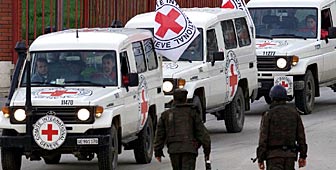Rules of war under spotlight on anniversary

A key anniversary in the development of international humanitarian law has given the chance to show that the Geneva conventions are still relevant.
The Swiss government and the International Committee of the Red Cross (ICRC) have organised a series of events in Geneva to mark the 25th anniversary of the adoption of the Additional Protocols to the Geneva Conventions.
The commemoration comes at an crucial juncture for international humanitarian law, given the US-led “war on terrorism”, the Israel reoccupation of parts of the Palestinian Territories and the threat of nuclear confrontation between India and Pakistan.
“What is frightening today is the emergence of organisations that openly proclaim their disregard for existing rules and their readiness to attack civilians,” says François Bugnion, Director of International Law at the ICRC.
Convention on show
Chief among the events in Geneva is the handing over on loan of the original 1864 Geneva Convention to the city’s Red Cross Museum. Normally kept in the Swiss federal archives in Bern – Switzerland is the depository country – this is the first time the Convention has been put on public display.
The four Geneva Conventions, which were adopted in 1949, are a set of rules aimed at limiting the impact of armed conflict on civilians and prisoners of war, and restricting the methods of waging war.
In 1977, these were supplemented by two further treaties, known as the Additional Protocols. This milestone in the protection of the individual in armed conflicts took into account new realities such as guerrilla warfare and advances in weapons technology, which allowed the battlefield to be extended ad infinitum.
“These protocols restored the principle of the protection of the civilian population against the effects of hostilities,” Bugnion says.
With a number of commentators questioning the relevance of the Geneva Conventions, the anniversary has provided the opportunity to show the continuing value not only of the protocols but also of international humanitarian law in general.
More relevant than ever
“The need to protect the victims of war and the need to limit violence is more pressing today than it ever has been,” Bugnion told swissinfo. He said the protocols were broad enough to cover developments in weapons technology and new means of waging war.
That was reflected by ICRC President, Jakob Kellenberger, in a speech marking the anniversary on Thursday evening: “We believe that these rules will be just as pertinent in the wars of tomorrow, since the fundamental values which need to be safeguarded are timeless,” he said.
Nevertheless, there has been pressure, particularly from the United States, to have the conventions revised to take account of recent developments, like the September 11 terrorist attacks and the subsequent “war on terrorism”.
As far the Swiss government and the ICRC are concerned, of greater urgency is ensuring that the existing rules are implemented and respected. They contend that any military action can be conducted within the framework of conventions as they now stand.
Nicolas Michel, Director of International Public Law at the Swiss foreign ministry, says the attacks on New York and Washington made many believe that the existing rules of war were no longer adequate.
“The more people examine the existing rules and what they permit you to do, the more they realise that that initial judgement was wrong. The existing rules address their concerns,” Michel told swissinfo.
Updating the conventions
“The difficulties our society is now facing is a good opportunity to reassert their importance, and the possible consequences of questioning them,” he added.
International law is not static. It is subject to constant refinement. Both Switzerland and the ICRC say that, having been updated in 1949 and 1977, there is no reason why the conventions cannot be revised again.
“We are open for dialogue, though, so far, no formal proposals have been made,” Bugnion says.
“We are ready to work with others when it is generally perceived that improvements can be made,” Michel adds.
In his speech, Kellenberger said international humanitarian law was not an obstacle to justice. He acknowledged that it was not perfect, but said there could only be calls for it to be amended once it was being properly implemented. He added that respect for and implementation of the conventions on the ground was “poor”.
“Any attempt to reevaluate its appropriateness can only take place after it has been determined that it is the law that is lacking, and not the political will to apply it,” the ICRC chief said.
Handing over the convention to the museum, the Swiss foreign minister Joseph Deiss said international humanitarian law could not be applied selectively, pointing out the great discrepancy between legal obligations and practical reality.
He noted, too, that many states had yet to ratify the Additional Protocols. He said ensuring application of existing law would remain Switzerland’s central task.
As the depository country of the Geneva Conventions, Switzerland has always considered the promotion of international humanitarian law to be a foreign policy priority. It has pledged to do this more assertively once it obtains United Nations membership later this year.
by Roy Probert

In compliance with the JTI standards
More: SWI swissinfo.ch certified by the Journalism Trust Initiative
You can find an overview of ongoing debates with our journalists here. Please join us!
If you want to start a conversation about a topic raised in this article or want to report factual errors, email us at english@swissinfo.ch.